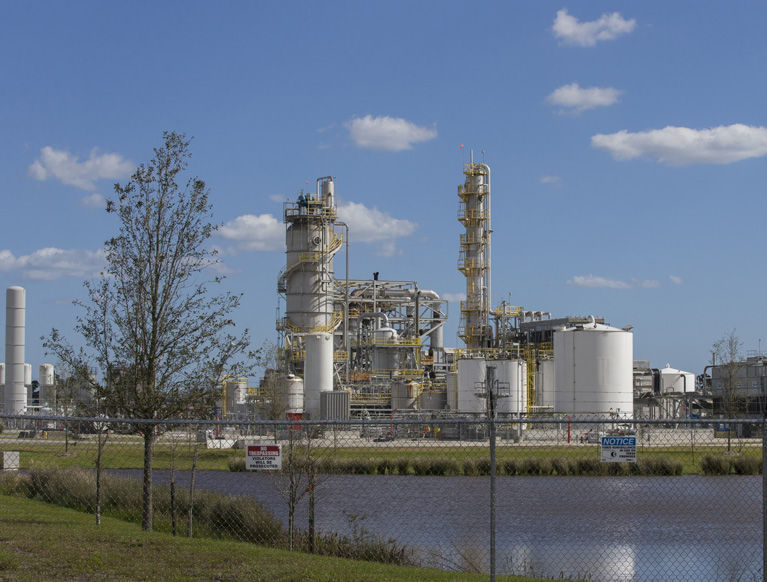
INDIAN RIVER COUNTY — Operators at the INEOS biofuel plant on Oslo Road have been told that unless the company owner sees production levels of ethanol by June, they will all be looking for a job in the wake of revelations by Vero Beach 32963 that the plant has generated little if any of the product it was built to produce.
Informed sources say that on Jan. 22, the crystal-clear message from INEOS owner and CEO Jim Ratcliffe was relayed to plant managers and operators.
Ratcliffe is a British chemical engineer turned financier who is said to be one of the richest people in the UK.
The operators were also informed that the next scheduled start-up date for the local Oslo Road plant is set for late February.
The day after the management meeting at the plant, the Florida Department of Environmental Protection sent its Southeast District compliance staff to inspect the INEOS facility, focusing on “the process equipment as well as air pollution control and monitoring equipment, making sure the facility is in compliance with the terms and conditions set out in its Air Permit.”
The rapidly approaching re-start date puts even more pressure on the plant staff, already struggling with technical glitches that have plagued the highly touted facility since it opened in 2013.
While company spokespersons have stated initial start-up problems are not unusual with such new technology, they’ve resulted in production of, at most, little more than a dribble of the biofuel ethanol, instead of the anticipated 8 million gallons per year the plant was built to produce.
In response to a request for INEOS production data required by the State, FDEP sources responded, “The facility has claimed that certain process and production information is confidential. Our Office of General Counsel is currently evaluating that claim and, therefore has advised that this information cannot currently be provided.”
Confidential sources have told Vero Beach 32963 that no ethanol was produced at all during 2013.
The chief reason the plant has not generated production levels of ethanol thus far, according to an FDEP report, has to do with the processing technology.
The report said that although the Vero Beach facility is officially in operation, “very little production of ethanol has occurred, primarily because of the sensitivity of the bio-organisms in the fermentation process to high levels of [hydrogen cyanide] in the syngas.”
Subsequent to the publication of the Vero Beach 32963 article, sources have revealed ongoing INEOS employee safety concerns. These included respiratory issues, and incidents including explosions in the bag house, gas leaks, dead birds found inside the plant, and the composition of fluids pumped into the on-site injection well.
These concerns are exacerbated by the history of hydrogen cyanide gas as a highly lethal chemical.
However, an INEOS spokesperson denied there have been employee health issues, saying “there have been no reports from staff of respiratory, sinus or headache issues. We have had no lost-time injuries at the site.”
Asked about explosions and leaks, the spokesperson said: “We have had four minor incidents with the bag house in 2½ years of operations. None of these incidents violated our permits with the State. We repaired and completed an upgrade of the bag house over the summer.”
As for dead birds, which sources maintain have been found during biofuel operations, the spokesperson said: “We have found two or three dead birds on site this year. We suspect they fly into our equipment. We actually have multiple birds nesting on site, which successfully raise chicks. We have a large population of wild birds around our ponds, including a large flock of wood storks, which appear to thrive.”
Because the biofuel processing aspect has not operated this year, the issue of birds succumbing to anything may well be moot at this time.
The FDEP said it had “not received any complaints or concerns related to dead birds found at the plant. If we should receive any calls related to this or if our inspector should see something like this, we would investigate in conjunction with the Florida Fish and Wildlife Conservation Commission.”
The plant owns and operates a state-permitted deep injection well, and is required to monitor, sample and report to the FDEP monthly.
INEOS’s spokesperson states that “the plant does not discharge chemicals directly into the effluent waste stream nor discharges hazardous waste via the injection well.”
“The Department is always concerned with any health issues and urges employees or the public to notify us when necessary,” the FDEP added.
Meanwhile, Indian River County says it remains satisfied with the service it has contracted with INEOS to provide – receiving and processing yard waste from county sources, for which the County currently pays $9.30 per ton.
County Administrator Joe Baird has previously stated he has no safety concerns: “They’re so heavily regulated by state and federal, it’s all just part of the process.”



